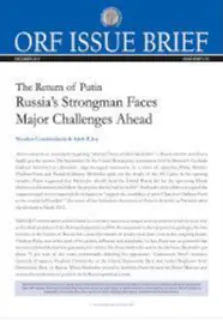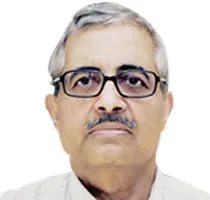After four years of uncertainty regarding “whither Putin, whither Medvedev” Russia and the world have finally got the answer. On September 24, the United Russia party convention held in Moscow’s Luzhniki Stadium witnessed an elaborately stage-managed manoeuvre. In a series of speeches, Prime Minister Vladimir Putin and President Dmitry Medvedev spelt out the details of the 2012 plan. In his opening remarks, Putin suggested that Medvedev should head the United Russia list for the upcoming Duma elections in December and follow the practice that he had set in 2007. Medvedev in his address accepted the suggestion and in turn requested the delegates to “support the candidacy of party Chairman Vladimir Putin as the country’s President.” The move all but formalizes the return of Putin to Kremlin as President after the elections in March 2012.
Medvedev’s renunciation (either forced or voluntary) was just as unique as the manner in which he took over as the third president of the Russian Federation in 2008. His ascension to the top post was, perhaps, the first instance in the history of Russia that a peaceful transfer of power took place even as the outgoing leader, Vladimir Putin, was at the peak of his power, influence and popularity. In fact, Putin was so powerful that anyone endorsed by him was guaranteed of victory. He chose Medvedev and in the elections, Medvedev got about 71 per cent of the votes, comfortably defeating his opponents—Communist Party’s nominee Gennady Zyuganov, Vladimir Zhirinovsky of the Liberal Democratic Party and Andrei Bogdanov from Democratic Party of Russia. When Medvedev moved to Kremlin, Putin became his Prime Minister and retained his predominant position in the Russian political system.
With the announcement of Putin’s return to presidency, the days of dyarchy are drawing to a close in Russia. Throughout the Medvedev presidency, most notably in the past one year, both Putin and Medvedev gave vague signals about their future plans, never once revealing their true intent. Medvedev had indicated that he was interested in another presidential term yet he categorically asserted that he would never run against Putin. Putin was more cryptic and on one occasion quipped that “neither of us (Medvedev and himself) rule out the possibility that either of us may take part in the election campaign.” Once he remarked that he would decide which of them would contest the elections after deliberations with Medvedev. Yet during the United Russia convention, Putin stated that “an agreement over what to do in the future was reached between us several years ago.” Medvedev concurred, “We really discussed this possible turn of events at the time when we formed our comradely union.” If this revelation is indeed true, it gives credence to the allegation that the Medvedev presidency has been an elaborate charade to conform to the letter of the constitution and that he was merely a place-holder for Putin—something that totally diminishes the stature of the already lame-duck president.
The views expressed above belong to the author(s). ORF research and analyses now available on Telegram! Click here to access our curated content — blogs, longforms and interviews.

 PDF Download
PDF Download



 PREV
PREV


